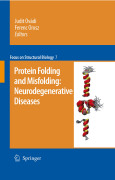The worldwide increasing age of populations brought the neurodegenerative diseases into the focus of interest. A number of the diverse human neurodegenerative diseases are now recognized as conformational diseases frequently caused by aggregations of unfolded or misfolded proteins. Knowledge on the intrinsically unstructured proteins, a new family of gene products as well as on the misfolded proteins produced by genetic mutation or environmental effects has been extensively accumulated in the past years. These proteins frequently cause proteolytic stress and/ or enter into aberrant, non-physiological protein-proteininteractions leading to sequestration of protein aggregates which are assemblies of many not-yet-identified components in addition to the deposition of well-characterized misfolded peptides and proteins such as b-amyloid, tau, a-synuclein and polyglutamine containing proteins. These protein assemblies display diverse ultrastructures such aggresomes, fibers, oligomers or amorphous structures, however, the nature of these species concerning their cytoprotective or cytotoxic effects has not been clarified yet. Will reflect the recent advancesand exponential growth of the field of neurodegeneration Will also provoke questions related to the molecular base and diversity of initiation of conformational diseases up to their pathological classification Theoretical and experimental studies as well as clinical aspects will be considered Some prediction methods and experimental techniques applicable in these fields will be presented as well
- ISBN: 978-1-4020-9433-0
- Editorial: Springer
- Encuadernacion: Cartoné
- Páginas: 274
- Fecha Publicación: 01/02/2009
- Nº Volúmenes: 1
- Idioma: Inglés

